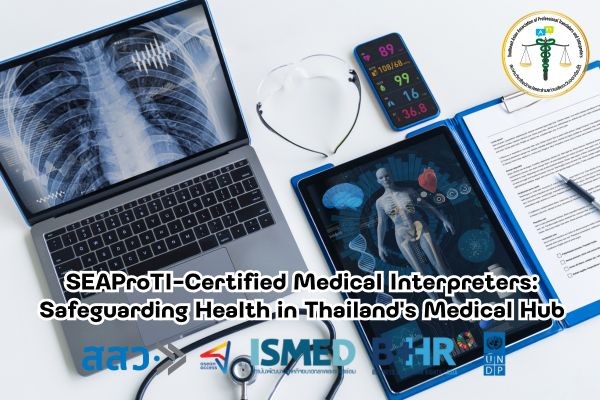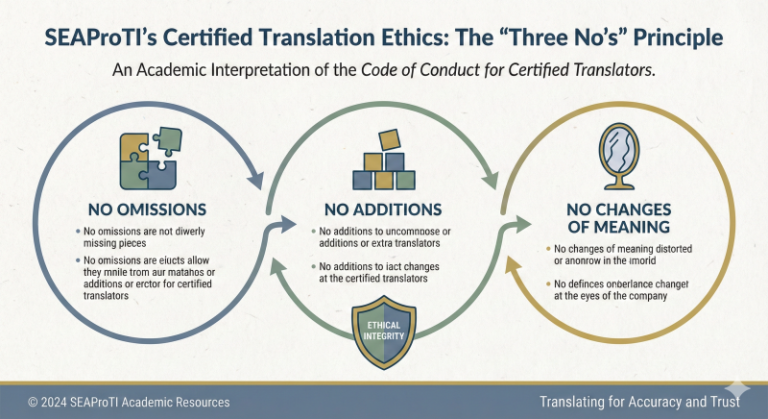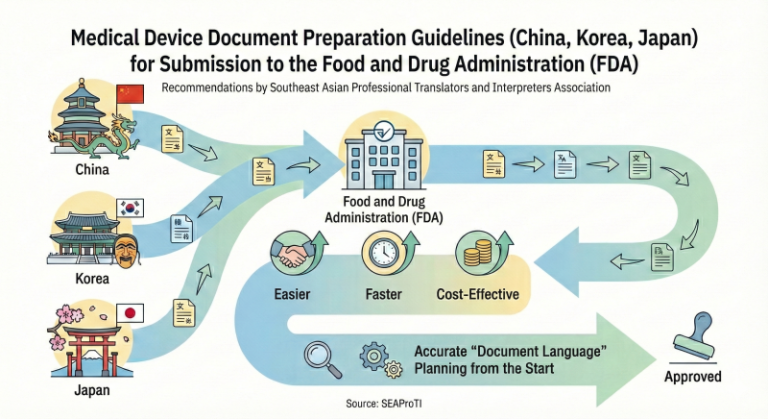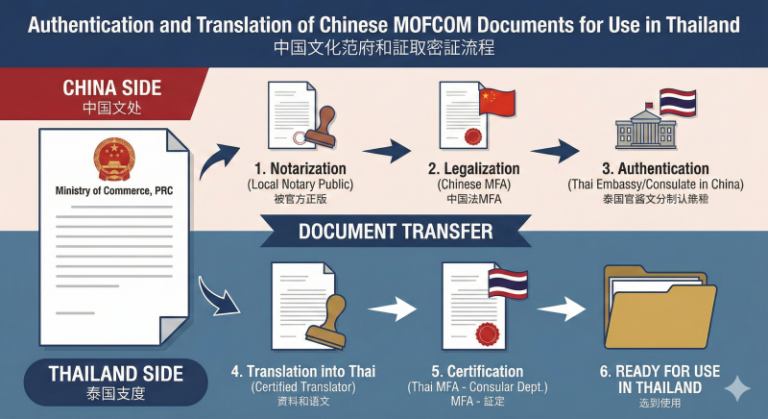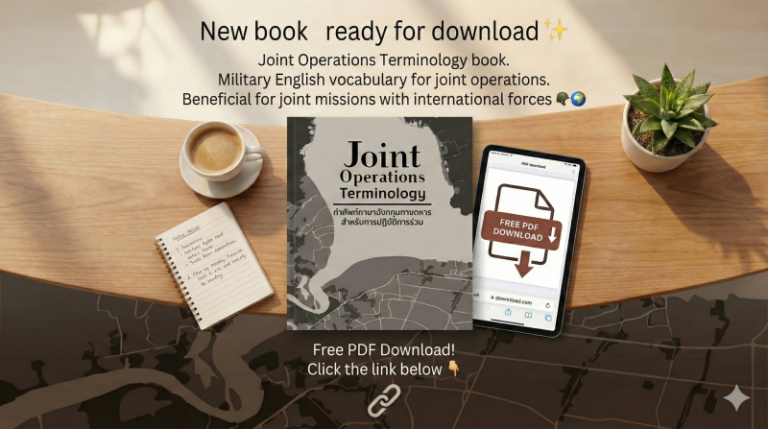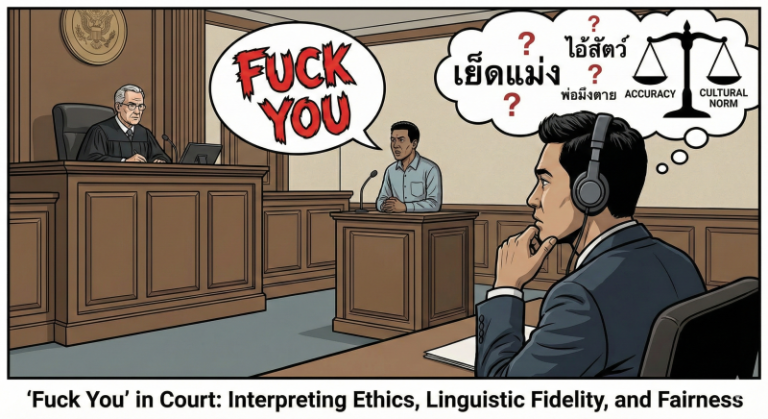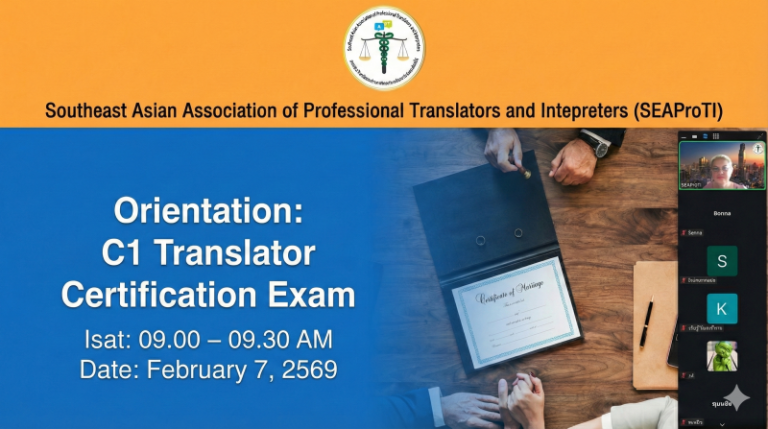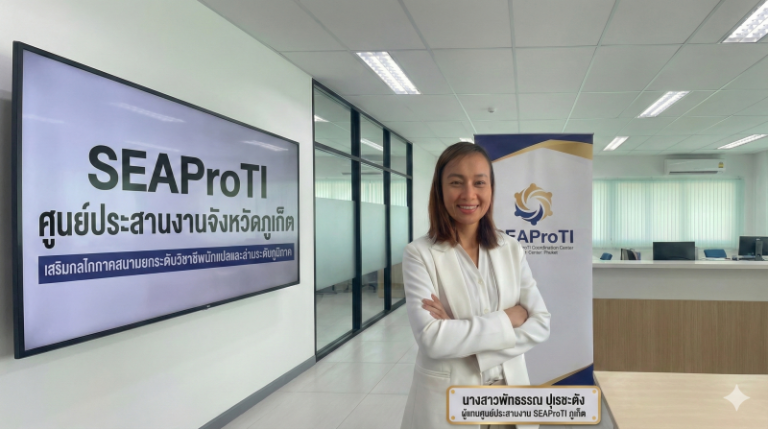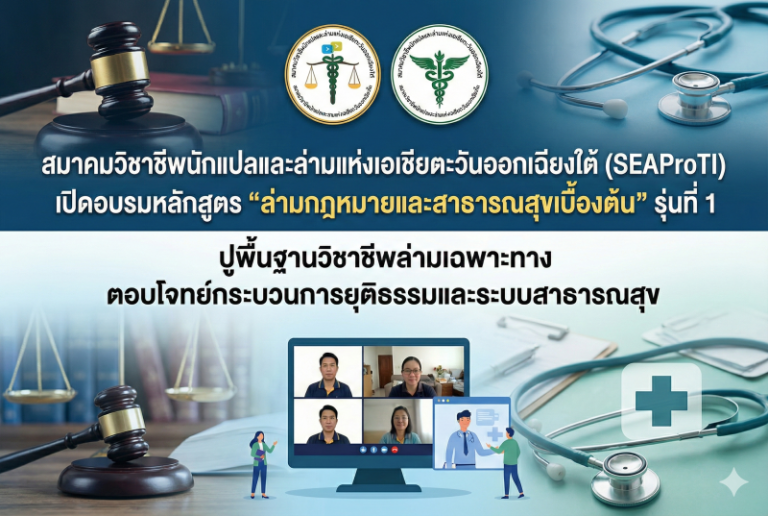Signing a Non-Disclosure Agreement (NDA) Before a Translation Engagement:
Legal and Professional Considerations for Translators
10 August 2025, Bangkok – A Non-Disclosure Agreement (NDA) is a legal instrument designed to protect a party’s confidential information. While traditionally associated with business, engineering, technology, and research, NDAs have become increasingly common in the translation and interpreting industry—even at the pre-contract stage—when agencies require translators to sign before viewing sensitive source materials. This article examines the appropriateness and legal risks of signing an NDA when no formal translation engagement has yet been agreed upon.
Legal Framework and Fundamental Principles
In Thailand, although no statute specifically governs NDAs, such agreements are enforceable under Section 369 of the Civil and Commercial Code, which allows contracting parties to set special terms provided they are not contrary to law or public morality (Office of the Council of State, 2023). An NDA thus constitutes a “special contract” enforceable under civil law, with breach potentially leading to damages claims.
In international practice, an NDA generally contains three essential elements (Kuner, 2013):
- Definition of “Confidential Information”
- Scope of information use
- Duration of confidentiality obligations
Overly broad or vague terms—such as clauses covering “all information of any kind” without clear limitation, or stipulating unlimited liability—can pose significant risks to the signing party.
Professional Risks
Signing an NDA before a translation engagement can carry several professional risks:
- Excessive contractual obligations: Certain NDAs may impose non-compete restrictions that prevent working with the client’s competitors beyond what is necessary.
- Inability to refuse work safely: If, after reviewing the source material, the translator finds it ethically objectionable or outside their area of expertise, restrictive terms could complicate refusal.
- Disputes over the scope of confidentiality: Without a precise definition, translators may face claims of breach merely for discussing general aspects of the source document.
Recommended Practices
To protect both the client’s confidentiality and the translator’s legal position, the following are advisable:
- Ensure the definition of “Confidential Information” is limited to the source text or data provided for project evaluation.
- Limit the duration of confidentiality to a reasonable period (e.g., 1–2 years).
- Avoid clauses that unnecessarily restrict work with other clients or agencies.
- Obtain written confirmation from the agency that the NDA applies solely to pre-engagement evaluation and not to an actual contractual obligation to perform the translation.
Conclusion
Signing an NDA before a translation engagement is not inherently problematic in the translation industry. However, it requires careful consideration from both legal and professional ethics perspectives. Translators should review the scope and terms of the NDA to ensure they protect the client’s interests without unduly restricting their rights. The decision to sign or decline should depend on the clarity of the terms and the credibility of the contracting party.
References
- Kuner, C. (2013). Transborder data flows and data privacy law. Oxford University Press.
- Office of the Council of State. (2023). Civil and Commercial Code. Retrieved from https://www.krisdika.go.th
About SEAProTI Certified Translators, Certification Providers, and Interpreters
The Southeast Asian Association of Professional Translators and Interpreters (SEAProTI) has published official guidelines and eligibility criteria for individuals seeking registration as Certified Translators, Translation Certification Providers, and Certified Interpreters under Chapter 9 and Chapter 10 of the Royal Thai Government Gazette, issued by the Secretariat of the Cabinet, Office of the Prime Minister, on 25 July 2024 (Vol. 141, Part 66 Ng, p. 100). Full text available at: The Royal Thai Government Gazette
การพิจารณาลงนามในสัญญาไม่เปิดเผยข้อมูล (NDA) ก่อนการว่าจ้างแปล: มุมมองทางกฎหมายและวิชาชีพนักแปล
10 สิงหาคม 2568, กรุงเทพมหานคร – สัญญาไม่เปิดเผยข้อมูล (Non-Disclosure Agreement: NDA) เป็นเครื่องมือทางกฎหมายที่ใช้คุ้มครองข้อมูลลับของคู่สัญญา โดยทั่วไปพบในบริบททางธุรกิจ วิศวกรรม เทคโนโลยี และงานวิจัย แต่ในอุตสาหกรรมการแปลเอกสารและการล่าม NDA เริ่มถูกนำมาใช้ตั้งแต่ขั้นตอนก่อนการว่าจ้าง เพื่อป้องกันการรั่วไหลของข้อมูลในต้นฉบับที่มีความอ่อนไหว บทความนี้จะวิเคราะห์ความเหมาะสมและข้อควรระวังก่อนนักแปลจะลงนามใน NDA ในกรณีที่ยังไม่มีการว่าจ้างอย่างเป็นทางการ
กรอบกฎหมายและหลักการพื้นฐาน
ในประเทศไทย แม้จะไม่มีกฎหมายเฉพาะที่ใช้บังคับกับ NDA แต่การทำสัญญาดังกล่าวมีผลบังคับตาม ประมวลกฎหมายแพ่งและพาณิชย์ มาตรา 369 ซึ่งบัญญัติว่าคู่สัญญาสามารถกำหนดข้อกำหนดพิเศษตามความตกลงกันได้ หากไม่ขัดต่อกฎหมายหรือศีลธรรมอันดี (สำนักงานคณะกรรมการกฤษฎีกา, 2566) NDA จึงถือเป็น “สัญญาพิเศษ” ที่มีผลผูกพันทางแพ่งและสามารถฟ้องร้องบังคับคดีได้ หากมีการละเมิดข้อกำหนด
ในทางกฎหมายระหว่างประเทศ NDA มักครอบคลุมองค์ประกอบสำคัญ 3 ประการ (Kuner, 2013):
- การนิยาม “ข้อมูลลับ” (Confidential Information)
- ขอบเขตการใช้ข้อมูล
- ระยะเวลาการรักษาความลับ
องค์ประกอบเหล่านี้หากเขียนกว้างหรือไม่ชัดเจนอาจก่อให้เกิดความเสี่ยง เช่น ข้อกำหนดที่ครอบคลุมข้อมูล “ทุกประเภท” โดยไม่จำกัดขอบเขต หรือการกำหนดโทษละเมิดแบบไม่จำกัดวงเงิน
ความเสี่ยงทางวิชาชีพ
การลงนามใน NDA ก่อนการว่าจ้างมีความเสี่ยงหลายประการ ได้แก่:
- ข้อผูกพันเกินความจำเป็น: หากสัญญามีเงื่อนไขกีดกันไม่ให้รับงานจากลูกค้าหรือคู่แข่งรายอื่นในอนาคต
- ไม่สามารถปฏิเสธงานได้อย่างปลอดภัย: หากหลังจากดูต้นฉบับแล้วพบว่าขัดจรรยาบรรณ หรืออยู่นอกขอบเขตความเชี่ยวชาญ แต่สัญญามีข้อจำกัดการปฏิเสธหรือการทำงานกับเอกสารประเภทนั้น
- ข้อพิพาทเกี่ยวกับขอบเขตข้อมูลลับ: หากไม่มีการนิยามชัดเจนว่าอะไรคือข้อมูลลับ อาจทำให้ถูกฟ้องแม้เพียงพูดถึงลักษณะทั่วไปของต้นฉบับ
แนวปฏิบัติที่แนะนำ
เพื่อคุ้มครองสิทธิและลดความเสี่ยง นักแปลควร:
- อ่านและทำความเข้าใจนิยาม “ข้อมูลลับ” ให้ครอบคลุมเฉพาะต้นฉบับหรือข้อมูลที่ได้รับเพื่อการประเมินงาน
- กำหนดระยะเวลาผูกพันที่สมเหตุสมผล (เช่น 1–2 ปี)
- หลีกเลี่ยงข้อสัญญาที่ห้ามทำงานกับบุคคลหรือหน่วยงานอื่นโดยไม่จำเป็น
- ขอหลักฐานยืนยันจากเอเจนซีว่า NDA ใช้เฉพาะเพื่อการดูต้นฉบับก่อนตัดสินใจรับงาน
บทสรุป
การลงนามใน NDA ก่อนการว่าจ้างไม่ใช่เรื่องผิดปกติในอุตสาหกรรมการแปลเอกสาร แต่จำเป็นต้องพิจารณาอย่างรอบคอบทั้งในมิติของกฎหมายและจรรยาบรรณวิชาชีพ นักแปลควรตรวจสอบขอบเขตและเงื่อนไขของสัญญาให้ชัดเจน เพื่อปกป้องทั้งข้อมูลของลูกค้าและสิทธิของตนเอง การยอมรับหรือปฏิเสธการลงนามควรขึ้นอยู่กับความชัดเจนของข้อกำหนดและความน่าเชื่อถือของคู่สัญญา
เอกสารอ้างอิง
- Kuner, C. (2013). Transborder data flows and data privacy law. Oxford University Press.
- สำนักงานคณะกรรมการกฤษฎีกา. (2566). ประมวลกฎหมายแพ่งและพาณิชย์. สืบค้นจาก https://www.krisdika.go.th
เกี่ยวกับนักแปลรับรอง ผู้รับรองการแปล และล่ามรับรองของสมาคมวิชาชีพนักแปลและล่ามแห่งเอเชียตะวันออกเฉียงใต้
สมาคมวิชาชีพนักแปลและล่ามแห่งเอเชียตะวันออกเฉียงใต้ (SEAProTI) ได้ประกาศหลักเกณฑ์และคุณสมบัติผู้ที่ขึ้นทะเบียนเป็น “นักแปลรับรอง (Certified Translators) และผู้รับรองการแปล (Translation Certification Providers) และล่ามรับรอง (Certified Interpreters)” ของสมาคม หมวดที่ 9 และหมวดที่ 10 ในราชกิจจานุเบกษา ของสำนักเลขาธิการคณะรัฐมนตรี ในสำนักนายกรัฐมนตรี แห่งราชอาณาจักรไทย ลงวันที่ 25 ก.ค. 2567 เล่มที่ 141 ตอนที่ 66 ง หน้า 100 อ่านฉบับเต็มได้ที่: นักแปลรับรอง ผู้รับรองการแปล และล่ามรับรอง



